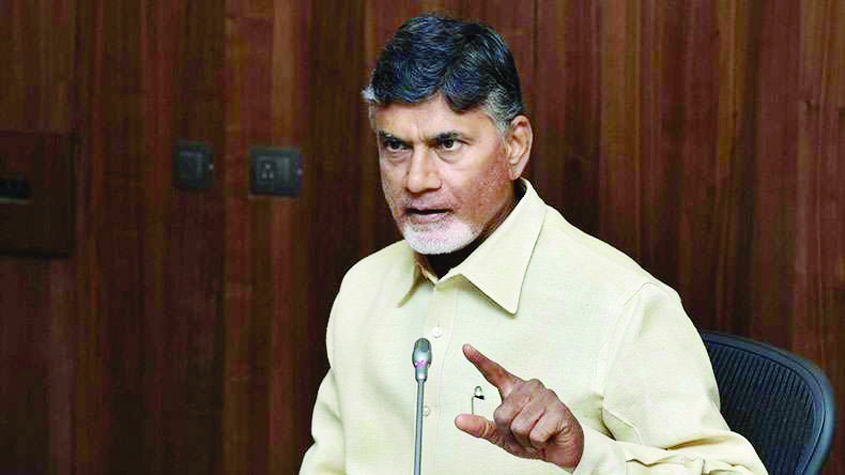Andhra Pradesh Chief Minister N. Chandrababu Naidu has surprised all by announcing a reward of Rs 100 crore for whoever from his newly-born state wins the prestigious Nobel Prize. His intention was to motivate school and college students, who turned up at the ongoing Indian Children’s Science Congress in Tirupati to go for the global prize.
The Indian Children’s Science Congress is a parallel event to the ongoing 104th Indian Science Congress at Tirupati inaugurated by Prime Minister Narendra Modi on 3 January. When Naidu asked the children to raise their hands if they were ready to strive to win the Nobel, the majority of the 6,000 crowd responded positively. But going by the ground situation of the education system as well as the quality of research in AP universities, the Chief Minister’s ambition appears cut off from reality.
Union Minister of State for Science and Technology, Sujana Chowdary, too, was present at the venue where the CM announced the reward. Top officials from the state and Central governments have termed the CM’s incentive as a first-of-its-kind from any state. However, several teachers, university faculty and office-bearers of scientific bodies in AP who spoke to The Sunday Guardian voiced their scepticism. A plethora of problems plaguing the educational institutions and the near absent research opportunities in the state offer grim prospects for youngsters to excel in basic science and technology, they feel.
Dr T.V. Rao, a senior scientist and adviser to Jana Vignana Vedika, which promotes scientific temper in the country, said that the Chief Minister should concentrate on improving science teaching in government schools that do not have basic facilities. Rao said that AP’s education system, for that matter in most government schools in the country, do not offer scope for creative thinking or path-breaking innovations which alone would win a Nobel. “Our teaching system is based on rote learning and textbook oriented. Our teachers strive for marks and parents look for ranks, so where is the scope for innovation?” he asked.
M. Gopala Rao, former vice-president of the Andhra Pradesh Teachers’ Federation, pointed to the grim reality of a majority of schools in AP lacking science labs and power supply, leave alone great experiments. “We have qualified teachers at secondary and high school level, but our school science labs are either rickety or non-existent. Not many schools have enough equipment to conduct practical,” he said.
AP has 60,462 primary and higher schools, with a total intake of 68.86 lakh students. Of this, as many as 44,585 are government schools, with an intake of 30.02 lakh students, while the remaining 15,000 private schools teach the remaining 30 lakh students. This shows most parents prefer private schools.
A senior functionary of the United Teachers’ Front (UTF), who preferred anonymity, said that the quality of teachers in most government, and even in private schools, is far from satisfactory. “Leave alone the Nobel, these teachers cannot produce an international scholar. Our teachers urgently require some continuous education and knowledge updates,” said the UTF leader.
Research conditions are lack in universities too. Prof D.S.N. Murthy, a senior faculty in the top graded Engineering College of Andhra University (AU), at Visakhapatnam, said that higher education in AP as well as in India is ridden with caste and group politics and steeped in corruption and inefficiency.
“Our teachers and faculty treat teaching as a mechanical process. We never encourage our students from raising serious questions in classrooms. Even parents at homes try to kill the inquisitiveness of their children. As long as our basic education does not encourage children to improve their knowledge, we cannot produce real scholars,” said Dr Murthy.
Though the universities were getting funds from the Centre and other institutions like World Bank of late, their utilisation was not proper, said Prof Murthy. “Even at the university level, I cannot see a situation where we can expect our students to produce a new theory which is essential for a Nobel scholar,” he said. “Forget Rs 100 crore, why cannot we give smaller prizes to those who excel?” he asked.
Dr B. Nagaraju, a senior scientist who worked with the Indian Council for Agricultural Research, too, felt that our research environment was not conducive to produce scientists. “We should encourage madness for excellence among our students. Teachers should be allowed to travel along with the students and aim for higher results in science and technology, not just job oriented marks and ranks,” said Dr Nagaraju.
A senior office-bearer of Andhra Pradesh Akademy of Sciences (APAS) told this newspaper that instead of announcing a Rs 100 crore reward to those who bag a Nobel, the CM should have announced many smaller prizes for those who produce research outputs or contribute articles in international journals. Former MLC C. Ramaiah, who represents the teachers’ constituency, told this newspaper that India can rightly expect a Nobel Prize winner anytime soon, but a lot needs to be done to shore up its basic science research facilities. “We are strong in Mathematics and Physics. All we need is a system where a child is nurtured from the elementary level to aim for something big and high,” said Ramaiah.

